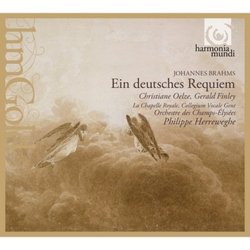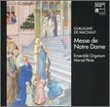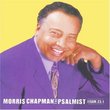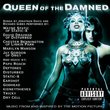| All Artists: Johannes Brahms, Gerald Finley, Christiane Oelze Title: Brahms: Ein Deutsches Requiem, Op.45 ( Herreweghe ) Members Wishing: 0 Total Copies: 1 Label: Harmonia Mundi Original Release Date: 1/1/1997 Re-Release Date: 11/8/1996 Album Type: Import Genre: Classical Styles: Opera & Classical Vocal, Chamber Music, Historical Periods, Classical (c.1770-1830), Early Music Number of Discs: 1 SwapaCD Credits: 1 UPC: 794881358229 |
Search - Johannes Brahms, Gerald Finley, Christiane Oelze :: Brahms: Ein Deutsches Requiem, Op.45 ( Herreweghe )
 | Johannes Brahms, Gerald Finley, Christiane Oelze Brahms: Ein Deutsches Requiem, Op.45 ( Herreweghe ) Genre: Classical
![header=[] body=[This CD is available to be requested as disc only.]](/images/attributes/disc.png?v=15401716) ![header=[] body=[This CD is unavailable to be requested with the disc and back insert at this time.]](/images/attributes/greyed_disc_back.png?v=15401716) ![header=[] body=[This CD is unavailable to be requested with the disc and front insert at this time.]](/images/attributes/greyed_disc_front.png?v=15401716) ![header=[] body=[This CD is unavailable to be requested with the disc, front and back inserts at this time.]](/images/attributes/greyed_disc_front_back.png?v=15401716) |
Larger Image |
CD DetailsSimilar CDsSimilarly Requested CDs
|
CD ReviewsThis one's on the top of my list Eric S. Kim | Southern California | 12/31/2005 (5 out of 5 stars) "The "classical" romanticist Johannes Brahms has created an astonishing and unique requiem after the death of his mother, and though it is not as dark as Mozart's or gentle as Faure's, it is still one of the finest ever created. Belgian-born conductor Philippe Herreweghe handles the tempi magnificiently (unlike John Eliot Gardiner, who sometimes takes the speed much faster than usual), and the orchestra and choir blend together to make one calling to the gracious Almighty. Gerald Finley has a darn good baritone voice, and at the beginning of "Herr, lehre doch mich," his first words are smooth and not strident, just the way I like it. Christian Oelze is good, too, although Brahms could have made just one more solo segment for the soprano. My favorite moment in this German Requiem is the second half of "Denn alles Fleisch, es ist wie Gras." It just sounds so powerful and energetic and extremely saintly. No other conductor's rendition of this five-minute powerhouse comes close, not even Herbert von Karajan's. Buy this recording, and also try the SACD version and pump up the volume. It'll sound like two dozen angels giving a lament inside your own room." GLORIOUS MOVIE MAVEN | New York, NY USA | 03/24/2001 (5 out of 5 stars) "Brahms' "A German Requiem" has got to be one of the most glorious pieces of choral music ever written and this performance must rank at, or near, the top of the pack: a)the soloists are first rate; b)the orchestra and choir cannot be bettered; c)Philippe Herreweghe is certainly one of the most respected conductors working today, especially, for me, with choral music; d)the sound on every Harmonia Mundi recording is always tops and this one is no exception. Certainly, the EMI Classics recording from 1962 is rightly considered by many to be the first choice in a pretty large field, mainly because of its legendary conductor, Otto Klemperer and soloists, Elisabeth Schwartzkopf and Dietrich Fischer-Dieskau. But if you can afford two recordings, buy this one also, if only for the 1996 sound: especially in the peaceful, reflective, quiet sections of the Requiem (and there are several of them), every word, every note is clear, perfectly sung and recorded." Herreweghe a Master of Styles R. Gerard | Pennsylvania USA | 06/23/2004 (5 out of 5 stars) "This is a prime example of Herreweghe's broad understanding of musical styles- the ability to convincingly conduct works from all eras from Lassus to Faure, Monteverdi to Beethoven, and oftentimes set a standard by which other recordings will be judged.
Just like his readings of Bach's St. Matthew Passion and Beethoven's Missa Solemnis, his German Requiem by Brahms is one of his most notable sets. First of all, Harmonia Mundi's sound quality is unsurprisingly flawless (and the SACD version is just thrilling.) A huge part of this disc's success is the way the orchestra and choruses, Champs Elysees, Chapelle Royale, and Collegium Vocale (all formed by Herreweghe himself) achieve balance. In Gardiner's (very good) recording I often found the brass section overbearing, for example. I never found such problems here. Herrewghe's interpretation is all about balance, bringing interesting colors out of the ensemble when appropriate. A historically-correct recording, the soloists do just fine... sounding neither to bland nor theatrical. Gerald Finley's "Herr lehre doch mich" is lighter in sound than what we may be used to, but so much the better - he compsensates for it in the show of emotion. We get the sense that he is truly "pleading." As for the interpretation itself- I've never heard a more uniform sound to a choir then Herreweghe's. You would be hard pressed to find a "Selig Sind die da Leid Tragen" with such an angelic purity of singing, or a "Denn alles Fleisch es ist wie Gras" with such ominous intensity. My favorite movement of Brahm's Requiem in general is in the third movement, when the ensemble bursts from the pleading bass/chorus aria into the joyful "Der gerechten Seelen" fugue, which is conceptually simple yet at the same time brilliant: a four voice fugue over one bass note that does not waver for the rest of the movement. And Herreweghe does it right. Like the other reviewer has said, Herreweghe's "Ein Deutsches Requiem" ranks at or near the top of my list. Reccomended- and get the SACD version, if you have a compatible player for it. You will not regret this purchase." |

 Track Listings (7) - Disc #1
Track Listings (7) - Disc #1









